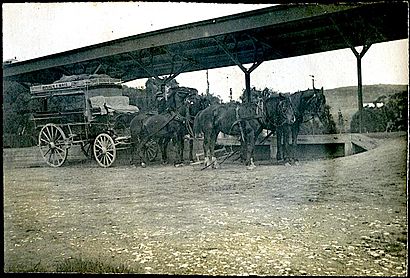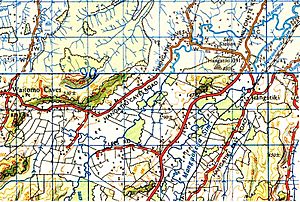Hangatiki railway station facts for kids
Quick facts for kids
Hangatiki railway station
|
|||||||||||
|---|---|---|---|---|---|---|---|---|---|---|---|

Waitomo Caves Royal Mail coach at Hangatiki in 1920
|
|||||||||||
| Location | New Zealand | ||||||||||
| Coordinates | 38°15′38″S 175°10′53″E / 38.260559°S 175.181379°E | ||||||||||
| Elevation | 40 m (130 ft) | ||||||||||
| Line(s) | North Island Main Trunk | ||||||||||
| Distance | Wellington 485.2 km (301.5 mi) | ||||||||||
| History | |||||||||||
| Opened | 2 December 1887 | ||||||||||
| Closed | 31 January 1982 passenger, 13 October 1986 goods |
||||||||||
| Electrified | June 1988 | ||||||||||
| Services | |||||||||||
|
|||||||||||
Hangatiki railway station was a special kind of train stop called a flag station in New Zealand. A flag station meant that trains would only stop if a passenger waved a flag to get on, or if someone on the train asked to get off.
In 1915, Hangatiki was a small town. It had a post office and a telegraph office. Many people got off the train here to visit the famous Waitomo and Ruakuri caves. The Waitomo Caves were about 6 mi (9.7 km) (about 10 km) away. There was a good road, and a special vehicle would meet the trains. This vehicle would take passengers to the Government Accommodation House at Waitomo. The ride cost 2 shillings and 6 pence each way, which would be about $18 in 2015 money.
History of Hangatiki Station
The railway line was being built in the area. Until August 1877, the company building the railway also ran a train service for goods. By October 1887, goods trains were running twice a week, on Mondays and Fridays.
A passenger train service started on these same days from December 2, 1887. By 1896, the station had a shelter shed for passengers. It also had a platform and a way for carts to get close to the trains. There was a goods shed, which was about 31 ft (9.4 m) (9.4 m) by 21 ft (6.4 m) (6.4 m). The station also had a passing loop, which is an extra track. This loop allowed trains to pass each other or wait for other trains to go by. It was long enough for 35 wagons.
In 1901, people asked for cattle yards to be built at the station. By 1911, there were yards for both cattle and sheep. In 1912, a "tablet porter" started working at the station. This person used a special system called a tablet system to make sure trains were safely spaced apart on the tracks.
A note from 1963 said the station building was built in 1888. It was last painted in 1953. However, in 1980, the station building was described as being made of concrete blocks. The passing loop was then long enough for 75 wagons.
Hangatiki station stopped taking passengers on January 31, 1982. It continued to handle goods, but only in full wagon loads. Finally, on October 13, 1986, the station closed completely for goods traffic too.
 | Jewel Prestage |
 | Ella Baker |
 | Fannie Lou Hamer |


